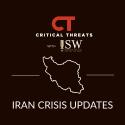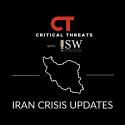Iran Crisis Update, December 15
Dec 15, 2022 - ISW PressThe Islamic Revolutionary Guards Corps (IRGC) is likely conducting an information operation to discredit the neighborhood youth protest organizations among demonstrators. IRGC-affiliated media outlets and social media accounts claimed on December 15 that these neighborhood groups have helped security forces identify and arrest protesters who send the groups information. These IRGC outlets claimed, contradictorily, that the neighborhood groups are reporting protesters to perpetuate unrest in Iran. These outlets also accused these neighborhood groups of having ties to Saudi Arabia and the Mojahedin-e Khalq. The claims that these neighborhood groups are simultaneously cooperating with the regime and its external adversaries seem incompatible but are likely part of an information effort to confuse protesters and sow distrust. The IRGC is likely trying to deter protester cooperation with these groups and prevent protesters from attending the groups’ planned demonstrations. These IRGC reports are the first major regime acknowledgement of the neighborhood youth groups, reflecting how seriously the regime perceives the threat they now pose.








